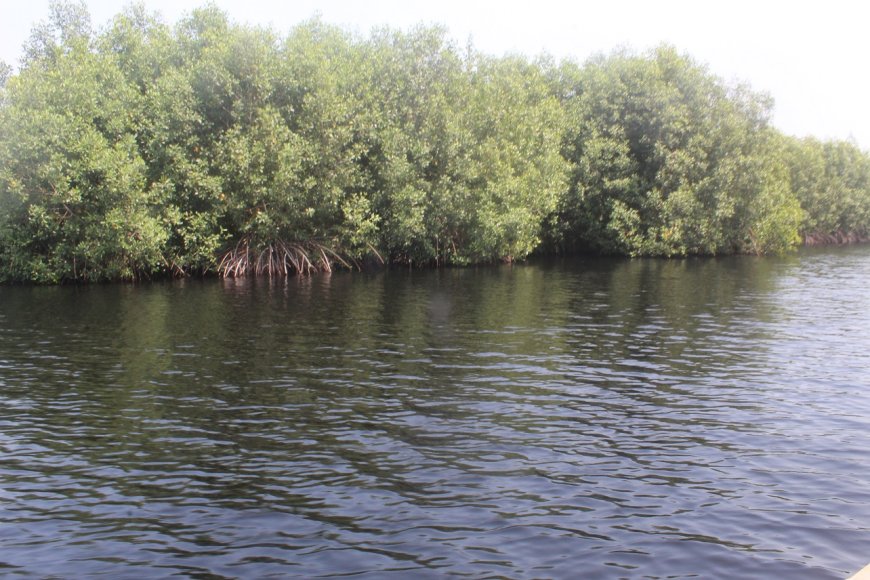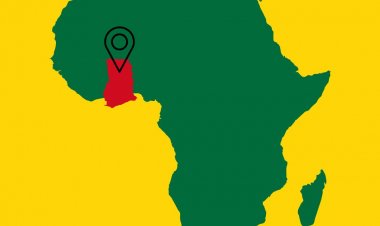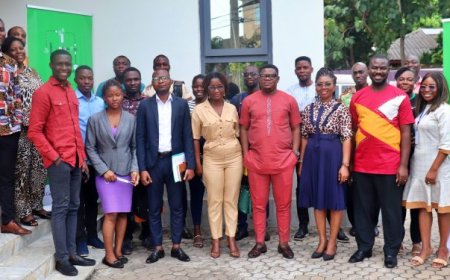Summary
- Ghana’s Nationally Determined Contributions (NDCs) and other national adaptation policies and strategies emphasise the centrality of locally relevant and appropriate climate adaptation measures.
- Despite the progress made in formulating climate policies, plans, strategies, and frameworks, a wide gap exists between such policies, plans, and frameworks and implementation in a manner that is informed and led by communities.
- Key challenges related to ineffective and unsustainable locally -led adaptation actions include limited financial resources, limited institutional support to communities, and limited coordination and governance of climate actions at the local level.
- Key opportunities for deepening locally- led adaptation include deep knowledge expressed by communities on their local ecosystems, including their natural resources; promotion of land management practices based on a community's understanding of local ecosystems and contexts; and the presence of social institutions and practices that promote collective action and decision-making.
Introduction
There is no shortage of evidence on the impacts of climate change in Ghana. Growing evidence shows that the impacts of climate change, as manifested through extreme weather events, drought, and increasing temperatures, are straining and negatively impacting health, livelihoods, and food security. National climate policy documents widely recognise that people and communities at the frontlines of climate change are often the most active and innovative in developing adaptation solutions.
Ghana’s Nationally Determined Contributions (NDCs) and its National Adaptation Policy Framework emphasise the principle of community-led adaptation and the centrality of locally relevant and appropriate climate adaptation measures. Yet, the needs, challenges, opportunities, and the entry points for strengthening locally-led adaptation are poorly understood.
This short analysis seeks to draw lessons from research by the Africa Policy Research Institute (APRI) on the status of climate change adaptation policies, strategies, initiatives, and practices to highlight opportunities and challenges for deepening locally-led adoption in Ghana. The analysis is based on preliminary insights from climate change policy landscape mapping, deep dives of case studies with a focus on agriculture, waste management, coastal erosion, and flooding, and insights from interviews and discussions with diverse national, regional and local stakeholders operating in the field of climate change.
Overview of National Adaptation Strategies, Initiatives, and Actions in Ghana
As part of its commitment to the Paris Agreement, Ghana prepared its Interim Nationally Determined Contribution (NDC) in 2020. The updated NDC specifies 47 programmes of action, comprising 13 adaptation measures and 34 mitigation actions. The key adaptation priorities focus on agriculture and food security, sustainable forest resource management, resilient infrastructure, climate change and health, water resources, and gender and the vulnerable.
In addition, the Ghanaian government has developed several policies and strategies aimed at supporting the policy and strategic direction of the NDCs. These include the National Climate Change Policy (NCCP), and the National Adaptation Policy Framework (2018). The Ghanaian government’s focus on adaptation actions has been on resilient infrastructure planning and strengthening of drylands agricultural landscape and food systems. Adaptation strategies further include a mix of behavioural, capacity building, technological, financial, and integrated approaches.
Key strategies include climate information services, integrated landscape planning, improving livelihoods, sea defence walls, resilient community infrastructure, crop insurance, and opportunities for improving livelihoods. Furthermore, as part of its investment into adaptation activities, the government is seeking to prioritise early warning and disaster risk management as well as integrated water resource management.
Local Adaptation Strategies, Initiatives and Actions
To advance implementation of the NDC, a number of local adaptation strategies are being promoted. These strategies include efforts to intensify sustainable forest resource management, climate-smart agriculture, crop insurance, community-based conservation actions, early warning mechanisms to minimise the impacts of floods, and disaster risk management. Other local adaptation actions include the promotion of livelihood opportunities for the youth and women in climate-vulnerable agriculture landscapes and food systems, especially in Northern Ghana, integrated water resources management, and reduction and recycling of waste. These efforts are being promoted through initiatives such as the Greater Accra Resilient and Integrated Development Project (GARID), the main objective of which is to develop sustainable capacity for flood risk management; Construction of Sea Defence Walls via Coastal Protection Projects; a Sustainable Land and Water Management Project; and Early Warning and Disaster Risk Management Initiatives at various sub-national levels.
Overview of Cases on Local Adaptation Initiatives
Due to the diversity of adaptation actions and initiatives at the local level in Ghana, this ongoing research sought to draw on various cases across Ghana’s three ecological zones to highlight some of the gaps, needs, and opportunities in strengthening adaptation in Ghana. The research in the first case engaged communities and local stakeholders in the West Gonja and Kassena-Nankana West District. It was conducted to gain insights into the extent to which livelihood opportunities for the youth and women in climate-vulnerable agriculture landscapes and food systems in Northern Ghana are being promoted.
The second case focused on adaptation practices in the Middle Belt to understand some of the needs, challenges, and opportunities associated with waste management and other efforts to reduce inflows of waste into drainage systems. A significant focus of this case was also to understand the barriers and opportunities related to early warning and disaster prevention activities in peri-urban areas that are highly vulnerable to floods.
In the third case, the research focused on communities that are highly vulnerable to coastal erosion and flooding, including Fuveme, Dzita, Anyanui, Salakope, Adina, Agavedzi, and Blekusu in the Volta Region. The research was conducted to understand some of the adaptation strategies being put up by the communities as well as narratives around the sea defence projects being constructed to strengthen resilience and adaptive capacity of the community.
Insights from Preliminary Results
Emerging lessons and insights from preliminary results show the following.
-
Climate change impacts continue to threaten livelihoods
The impacts of climate change were evident and experienced by local communities across all the three case study sites. The scale of climate change impacts in Ghana was further underlined in discussions with national, regional, and local stakeholders, with participants noting the impacts climate change has on landscapes, forest resources, and tree cover. Due to a combination of factors such as erratic rainfall, droughts, and sea-level rise, communities continue to face threats to livelihoods as well as constrained productive capacity and loss of income. These impacts provide an opportunity and a strong entry point for Ghana to deepen its effort to reduce vulnerability and build community resilient and adaptive capacity to support life and livelihood needs and environmental protection efforts.
Communities are actively participating in different actions to adapt to the changing climate and its impact on their lives and livelihoods. Initial results from the three case studies show that local communities are using local knowledge and practices on their local ecosystems, natural resources, and weather patterns to engage in climate-smart agriculture, community-based conservation and land management actions, community-led irrigation systems, energy-efficient cooking stoves, recycling of waste, and local home elevation.These diverse strategies provide opportunities for the Ghanaian government to learn from and for it to build consciously on the wealth of local practices to develop and implement adaptation actions in various sectors. Tapping into these opportunities will ensure that local communities’ priorities, resources, and needs are centred in adaptation policies and implementation efforts across all levels of government. The study also noted that the local communities are developing community-led social institutions and practices to promote collective action and decision-making.
-
Mounting challenges and barriers constrain the effectiveness, sustainability, and scalability of adaptation efforts.
The research further noted several challenges and barriers that confront adaptation efforts.
First, it emerged that communities have limited access to national policy guidelines and resources (financial, human, skills, and appropriate technologies) and to the agency needed to implement local innovative solutions effectively and sustainably. Local communities complained of limited access and opportunities to receive adequate financial and technical support to deepen locally appropriate climate change adaptation interventions.
Second, there is limited institutional support to communities to adapt to climate change. The study showed that governments and other institutions often have limited local level interventions and capacity to effectively support locally-led adaptation, which can hinder the efforts of local communities. This lack of support could hinder the spread of adaptation technologies and actions across the country.
Third, while there are multiple national, subnational, and sectoral strategies addressing climate change, these structures are not well aligned, resulting in limited coordination.
-
External support and facilitation are relevant to strengthening locally-led adaptation
Across the various geographical zones, the research showed that external facilitation from government, private sector, and civil society organisations is sought for and is relevant to supporting access to knowledge, funding, and other opportunities. In the Volta Region, for example, communities perceive the central government as the entity most appropriate for constructing large capital projects such as the sea defence walls.
The importance of this support was underscored in the Kassena-Nankana West District communities, where local NGOs, such as the Organisation for Indigenous Initiatives and Sustainability (ORGIIS GHANA), are facilitating the increased adoption and use of climate-smart agriculture, mainly the restoration ecological systems and local irrigation services for dry season farming. This type of farming enables communities to continue to undertake farming activities during the dry seasons or in the event of insufficient rainfall.
In the Middle Belt zone, the study also found that social enterprises such as Advanced Packaging are working with communities across the Ashanti Region to collect and convert waste into other products. The aim of this action is to minimise the impact of the waste on urban development, particularly floods. More Women, a local-based NGO, has been facilitating community efforts to use energy-saving stoves in boiling shea nuts and promoting the use of biogas in the West Gonja District.
-
Implications for Ghana’s adaptation efforts and initiatives
It is generally recognised that climate change impacts are place- and context-specific. Thus, to inform the development of appropriate responses to climate change, it is important that the unique attributes of places are carefully understood. Based on these initial results and analysis, we can draw several implications for climate action in Ghana.
First, community adaptation practices provide a bedrock for further support. This suggests that the government’s recent effort to promote district-specific vulnerability assessment remains an essential step that will help to uncover a district-specific place-based understanding of the vulnerabilities and impacts being faced. It will also be an entry point for identifying measures to build and strengthen communities’ resilience and adaptive capacities.
Second, the research further highlights that locally-led adaptation provides opportunities for communities to take ownership of their development and adaptation efforts, which could lead to greater empowerment and improved climate action decision-making and governance processes.
Third, insights from the ongoing case studies demonstrate that locally -led climate adaptation is important because such priorities place the power on local communities to influence adaptation efforts. Ghana’s adaptation effort should, therefore, intentionally build on community efforts, entrusting finances and delegating authority and power to local communities to use resources to protect themselves and build resilience. Allowing local actors to lead climate adaptation efforts is not only beneficial in environmental terms but can also deliver democratic, equitable, context- relevant, and effective solutions.
Conclusion
The lessons from the ongoing research on local adaptation efforts have highlighted several challenges and opportunities for strengthening adaptation as part of the implementation of the NDCs and other national climate action policies. The foregoing has also shown that greater attention to locally-led adaptation could strengthen Ghana’s climate action by ensuring that such efforts incorporate traditional knowledge, practices, and systems, which have been developed over generations and have proven to be sustainable. Therefore, an intentional approach to learning from context-specific vulnerabilities and adaptation responses would help the Ghanaian government to capture innovative and indigenous practices led by communities. These solutions often speak to the needs and priorities of communities and, therefore, are likely to be more effective and sustainable in meeting life and livelihood needs and building resilient communities.
About the Authors
Dr. Albert Arhin is the Lead Researcher for the project “Climate Adaptation Strategies and Initiatives: Issues and Pathways in Ghana”. Dr. Arhin is a sustainability expert with more than fifteen years of experience in research, technical support, and strategic planning in climate change, REDD+ and land restoration policies, green economy, and sustainable development.
Richard Tetteh is a Research Assistant for the project “Climate Adaptation Strategies and Initiatives: Issues and Pathways in Ghana”. Richard is an Agricultural Extension and Development Specialist with over four years of experience in stakeholder engagement, sustainable rural development, climate change studies, monitoring and evaluation studies, social research, workshop facilitation, and project planning and management.
Acknowledgements
The authors would like to acknowledge and thank Dr. Olumide Abimbola Executive Director, APRI) for overall guidance, Dr. Grace Mbungu (Senior Fellow and Head of Climate Change Program, APRI) for project leadership and Bouchra Tafrata (Project Coordinator, APRI) for administrative support. Special thanks go to Dr. Theophilus Acheampong Visiting Senior Fellow, APRI, for the helpful comments and feedback on the manuscript, as well as Ruka Samusi (Executive Director, GCIC) and Dramani Bukari (Director of Entrepreneurship, Partnerships, and Investments, GCIC) for their support.


